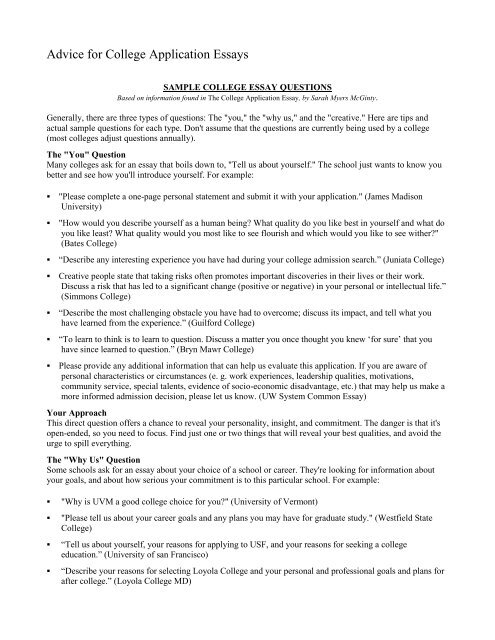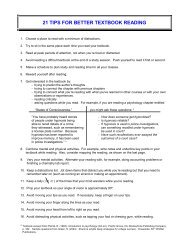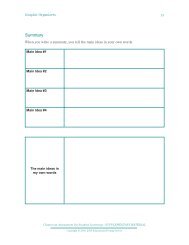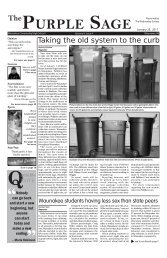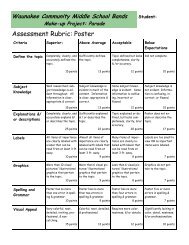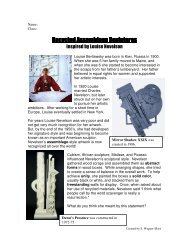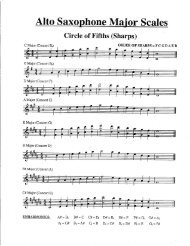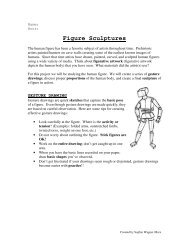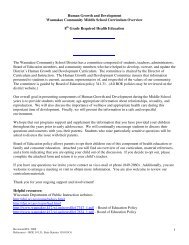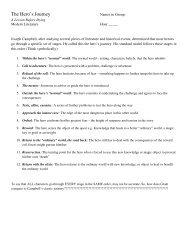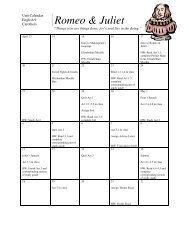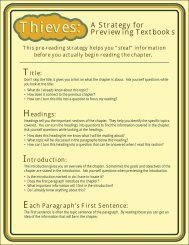Advice for College Application Essays - Waunakee Community ...
Advice for College Application Essays - Waunakee Community ...
Advice for College Application Essays - Waunakee Community ...
Create successful ePaper yourself
Turn your PDF publications into a flip-book with our unique Google optimized e-Paper software.
<strong>Advice</strong> <strong>for</strong> <strong>College</strong> <strong>Application</strong> <strong>Essays</strong><br />
SAMPLE COLLEGE ESSAY QUESTIONS<br />
Based on in<strong>for</strong>mation found in The <strong>College</strong> <strong>Application</strong> Essay, by Sarah Myers McGinty.<br />
Generally, there are three types of questions: The "you," the "why us," and the "creative." Here are tips and<br />
actual sample questions <strong>for</strong> each type. Don't assume that the questions are currently being used by a college<br />
(most colleges adjust questions annually).<br />
The "You" Question<br />
Many colleges ask <strong>for</strong> an essay that boils down to, "Tell us about yourself." The school just wants to know you<br />
better and see how you'll introduce yourself. For example:<br />
• "Please complete a one-page personal statement and submit it with your application." (James Madison<br />
University)<br />
• "How would you describe yourself as a human being What quality do you like best in yourself and what do<br />
you like least What quality would you most like to see flourish and which would you like to see wither"<br />
(Bates <strong>College</strong>)<br />
• “Describe any interesting experience you have had during your college admission search.” (Juniata <strong>College</strong>)<br />
• Creative people state that taking risks often promotes important discoveries in their lives or their work.<br />
Discuss a risk that has led to a significant change (positive or negative) in your personal or intellectual life.”<br />
(Simmons <strong>College</strong>)<br />
• “Describe the most challenging obstacle you have had to overcome; discuss its impact, and tell what you<br />
have learned from the experience.” (Guil<strong>for</strong>d <strong>College</strong>)<br />
• “To learn to think is to learn to question. Discuss a matter you once thought you knew „<strong>for</strong> sure‟ that you<br />
have since learned to question.” (Bryn Mawr <strong>College</strong>)<br />
• Please provide any additional in<strong>for</strong>mation that can help us evaluate this application. If you are aware of<br />
personal characteristics or circumstances (e. g. work experiences, leadership qualities, motivations,<br />
community service, special talents, evidence of socio-economic disadvantage, etc.) that may help us make a<br />
more in<strong>for</strong>med admission decision, please let us know. (UW System Common Essay)<br />
Your Approach<br />
This direct question offers a chance to reveal your personality, insight, and commitment. The danger is that it's<br />
open-ended, so you need to focus. Find just one or two things that will reveal your best qualities, and avoid the<br />
urge to spill everything.<br />
The "Why Us" Question<br />
Some schools ask <strong>for</strong> an essay about your choice of a school or career. They're looking <strong>for</strong> in<strong>for</strong>mation about<br />
your goals, and about how serious your commitment is to this particular school. For example:<br />
• "Why is UVM a good college choice <strong>for</strong> you" (University of Vermont)<br />
• "Please tell us about your career goals and any plans you may have <strong>for</strong> graduate study." (Westfield State<br />
<strong>College</strong>)<br />
• “Tell us about yourself, your reasons <strong>for</strong> applying to USF, and your reasons <strong>for</strong> seeking a college<br />
education.” (University of san Francisco)<br />
• “Describe your reasons <strong>for</strong> selecting Loyola <strong>College</strong> and your personal and professional goals and plans <strong>for</strong><br />
after college.” (Loyola <strong>College</strong> MD)
• “We would like to know…what experiences have led you to select to select your professional field and<br />
objective.” (Boston University)<br />
• Please relate your interest in studying at Georgetown University to your future goals.” (Georgetown<br />
University)<br />
• The statement of purpose is a personal essay that provides insight into your specific reasons <strong>for</strong> applying to<br />
SAIC. In the statement of purpose, you should discuss your interests, creative influences, educational goals,<br />
and anything else that is important <strong>for</strong> us to know regarding your interest in art, design, and visual culture.<br />
Through your statement of purpose the Undergraduate Committee on Admissions is interested in finding out<br />
more about you as an individual and how you represent yourself in a written <strong>for</strong>mat. (The School of the Art<br />
Institute of Chicago)<br />
Your Approach<br />
The focus is provided: Why did you choose this school or path This should be pretty clear to you, since you<br />
probably went through some kind of selection process. Make sure you know your subject well. For example, if<br />
you say you want to attend Carleton <strong>College</strong> to major in agriculture, the school will be able to tell how carefully<br />
you've chosen (Carleton doesn't have an agriculture major).<br />
The "Creative" Question<br />
Some colleges evaluate you through your choice of some tangential item: a national issue, a famous person,<br />
what you would put in a time capsule, a photograph. Here the school is looking at your creativity and the<br />
breadth of your knowledge and education. For example:<br />
• "Do you believe there's a generation gap Describe the differences between your generation and others."<br />
(Denison University)<br />
• "Indicate a person who has had a significant influence on you, and describe that influence." (Common<br />
<strong>Application</strong>)<br />
• Discuss some issue of personal, local, national, or international concern and its importance to you.”<br />
(Common <strong>Application</strong>)<br />
• “In your opinion, what is the greatest challenge that your generation will face What ideas do you have <strong>for</strong><br />
dealing with this issue” (<strong>College</strong> of the Holy Cross)<br />
• What is the value and importance of community service in our society and tell us what it means to you.”<br />
(Ohio Wesleyan University)<br />
• “John Keats said, „Even a proverb is no proverb to you until your life has illustrated it.‟ Please tell us about<br />
an experience in your own life which illustrated a proverb, maxim, or quote that has special meaning <strong>for</strong><br />
you.” (Duke University)<br />
• “You have just completed your 300-page autobiography. Please submit page 217.” (University of<br />
Pennsylvania)<br />
• “For some prognosticators the end of the worldwas in sight by the year 1000. How do you <strong>for</strong>esee your<br />
world of 2020” (Dickinson <strong>College</strong>)
RECIPE FOR A DRAFT<br />
Based on in<strong>for</strong>mation found in The <strong>College</strong> <strong>Application</strong> Essay, by Sarah Myers McGinty.<br />
Sometimes the hardest part of writing a college admissions essay is just getting started. Here's a quick exercise<br />
to get pen to paper (or keyboard to computer).<br />
Step 1: Think about yourself<br />
What are your strengths and weaknesses What are your best qualities Are you a plugger An intellectual A<br />
creative type Curious Passionate Determined<br />
Step 2: Choose a positive quality you'd like to convey to the admissions committee<br />
Don't pick an event or something you've done. President of the Nuclear Awareness Club is not a personal<br />
quality. Focus on a quality of your mind or of your character. Complete this sentence: "I am a very _________<br />
person."<br />
Step 3: Tell a story<br />
Set a timer <strong>for</strong> 20 minutes. Pretend you're taking an exam at high school and responding to, "Tell a story about<br />
an experience or time when you showed you were a very _________ person." Use the characteristic you<br />
identified in Step 2. Write or type non-stop <strong>for</strong> 20 minutes; <strong>for</strong>ce yourself to keep telling the story and what it<br />
reveals until the timer goes off.<br />
You're Done<br />
Okay. That's it. You've got a rough draft <strong>for</strong> your college application essay. Look at the college application<br />
<strong>for</strong>ms and see what questions they ask. No matter what the questions are, you've already identified the important<br />
characteristic you want to convey to each college.<br />
THREE STEPS TO A GREAT COLLEGE ESSAY<br />
Based on in<strong>for</strong>mation found in The <strong>College</strong> <strong>Application</strong> Essay, by Sarah Myers McGinty.<br />
The college application essay is a chance to explain yourself, to open your personality, charm, talents, vision,<br />
and spirit to the admissions committee in 500 words or fewer. It's a chance to show you can think about things<br />
and that you can write clearly about your thoughts. Don't let the chance disappear. Stand up straight and believe<br />
in yourself!<br />
The Essay Writing Process<br />
Okay, boot up your computer and let's get to it. To write a college essay, use the exact same three-step process<br />
you'd use to write an essay <strong>for</strong> class: first prewrite, then draft, and finally, edit. This process will help you<br />
identify a focus <strong>for</strong> your essay, and gather the details you'll need to support it.<br />
Prewriting<br />
To begin, you must first collect and organize potential ideas <strong>for</strong> your essay's focus. Since all essay questions are<br />
attempts to learn about you, begin with yourself.<br />
• Brainstorm: Set a timer <strong>for</strong> 15 minutes and make a list of your strengths and outstanding characteristics.<br />
Focus on strengths of personality, not things you've done. For example, you are responsible (not an "Eagle<br />
Scout") or committed (not "played basketball"). If you keep drifting toward events rather than characteristics,<br />
make a second list of the things you've done, places you've been, accomplishments you're proud of; use them<br />
<strong>for</strong> the activities section of your application.<br />
• Discover Your Strengths: Do a little research about yourself: ask parents, friends, and teachers what your<br />
strengths are.
• Create a Self-Outline: Now, next to each trait, list five or six pieces of evidence from your life—things<br />
you've been or done—that prove your point.<br />
• Find Patterns and Connections: Look <strong>for</strong> patterns in the material you've brainstormed. Group similar ideas<br />
and events together. For example, does your passion <strong>for</strong> numbers show up in your per<strong>for</strong>mance in the state<br />
math competition and your summer job at the computer store Was basketball about sports or about<br />
friendships When else have you stuck with the hard work to be with people who matter to you<br />
Drafting<br />
Now it's time to get down to the actual writing. Write your essay in three basic parts: introduction, body, and<br />
conclusion.<br />
• The introduction gives your reader an idea of your essay's content. It can shrink when you need to be concise.<br />
One vivid sentence might do: "The favorite science project was a complete failure."<br />
• The body presents the evidence that supports your main idea. Use narration and incident to show rather than<br />
tell.<br />
• The conclusion can be brief as well, a few sentences to nail down the meaning of the events and incidents<br />
you've described.<br />
An application essay doesn't need to read like an essay about The Bluest Eye or the Congress of Vienna, but<br />
thinking in terms of these three traditional parts is a good way to organize your main points.<br />
There are three basic essay styles you should consider:<br />
• Standard Essay: Take two or three points from your self-outline, give a paragraph to each, and make sure<br />
you provide plenty of evidence. Choose things not apparent from the rest of your application or light up some<br />
of the activities and experiences listed there.<br />
• Less-Is-More Essay: In this <strong>for</strong>mat, you focus on a single interesting point about yourself. It works well <strong>for</strong><br />
brief essays of a paragraph or half a page.<br />
• Narrative Essay: A narrative essay tells a short and vivid story. Omit the introduction, write one or two<br />
narrative paragraphs that grab and engage the reader's attention, then explain what this little tale reveals about<br />
you.<br />
Editing<br />
When you have a good draft, it's time to make final improvements to your draft, find and correct any errors, and<br />
get someone else to give you feedback. Remember, you are your best editor. No one can speak <strong>for</strong> you; your<br />
own words and ideas are your best bet.<br />
• Let It Cool: Take a break from your work and come back to it in a few days. Does your main idea come<br />
across clearly Do you prove your points with specific details Is your essay easy to read aloud<br />
• Feedback Time: Have someone you like and trust (but someone likely to tell you the truth) read your essay.<br />
Ask them to tell you what they think you're trying to convey. Did they get it right<br />
• Edit Down: Your language should be simple, direct, and clear. This is a personal essay, not a term paper.<br />
Make every word count (e.g., if you wrote "in society today," consider changing that to "now").<br />
• Proofread Two More Times: Careless spelling or grammatical errors, awkward language, or fuzzy logic will<br />
make your essay memorable—in a bad way.
COLLEGE ESSAY WRITING TIPS<br />
Based on in<strong>for</strong>mation found in The <strong>College</strong> <strong>Application</strong> Essay, by Sarah Myers McGinty.<br />
Write an Effective <strong>Application</strong> Essay<br />
A great application essay will present a vivid, personal, and compelling view of you to the admissions staff. It<br />
will round out the rest of your application and help you stand out from the other applicants. The essay is one of<br />
the only parts of your application over which you have complete control, so take the time to do a good job on it.<br />
Check out these tips be<strong>for</strong>e you begin.<br />
Dos<br />
Keep Your Focus Narrow and Personal<br />
Your essay must prove a single point or thesis. The reader must be able to find your main idea and follow it<br />
from beginning to end. Try having someone read just your introduction to see what he thinks your essay is<br />
about.<br />
<strong>Essays</strong> that try to be too comprehensive end up sounding watered-down. Remember, it's not about telling the<br />
committee what you've done—they can pick that up from your list of activities—instead, it's about showing<br />
them who you are.<br />
Prove It<br />
Develop your main idea with vivid and specific facts, events, quotations, examples, and reasons. There's a big<br />
difference between simply stating a point of view and letting an idea unfold in the details:<br />
• Okay: "I like to be surrounded by people with a variety of backgrounds and interests"<br />
• Better: "During that night, I sang the theme song from Casablanca with a baseball coach who thinks he's<br />
Bogie, discussed Marxism with a little old lady, and heard more than I ever wanted to know about some<br />
woman's gall bladder operation."<br />
Be Specific<br />
Avoid clichéd, generic, and predictable writing by using vivid and specific details.<br />
• Okay: "I want to help people. I have gotten so much out of life through the love and guidance of my family, I<br />
feel that many individuals have not been as <strong>for</strong>tunate; there<strong>for</strong>e, I would like to expand the lives of others."<br />
• Better: "My Mom and Dad stood on plenty of sidelines 'til their shoes filled with water or their fingers turned<br />
white, or somebody's golden retriever signed his name on their coats in mud. I think that kind of commitment<br />
is what I'd like to bring to working with fourth-graders."<br />
Don'ts<br />
Don't Tell Them What You Think They Want to Hear<br />
Most admissions officers read plenty of essays about the charms of their university, the evils of terrorism, and<br />
the personal commitment involved in being a doctor. Bring something new to the table, not just what you think<br />
they want to hear.<br />
Don't Write a Resume<br />
Don't include in<strong>for</strong>mation that is found elsewhere in the application. Your essay will end up sounding like an<br />
autobiography, travelogue, or laundry list. Yawn.<br />
• "During my junior year, I played first singles on the tennis team, served on the student council, maintained a<br />
B+ average, traveled to France, and worked at a cheese factory."
Don't Use 50 Words When Five Will Do<br />
Eliminate unnecessary words.<br />
• Okay: "Over the years it has been pointed out to me by my parents, friends, and teachers—and I have even<br />
noticed this about myself, as well—that I am not the neatest person in the world."<br />
• Better: "I'm a slob."<br />
Don't Forget to Proofread<br />
Typos and spelling or grammatical errors can be interpreted as carelessness or just bad writing. Don't rely on<br />
your computer's spell check. It can miss spelling errors like the ones below.<br />
• "After I graduate <strong>for</strong>m high school, I plan to work <strong>for</strong> a nonprofit organization during the summer."<br />
• "From that day on, Daniel was my best fried."
EXAMPLE COLLEGE APPLICATION ESSAY<br />
The Total Package by Lawrence Schlossman, October 31, 2004<br />
Write a concise statement with any additional in<strong>for</strong>mation that is important to convey to the admissions<br />
committee. In<strong>for</strong>mation that may be important might include your aspirations, work experience, creative<br />
talents, factors affecting your academic record, or why you are applying to UWMadison. You may wish to<br />
attach a separate page <strong>for</strong> your statement. This is an important part of your application.<br />
I know University of Wisconsin- Madison is right <strong>for</strong> me. At a school like University of Wisconsin I can not<br />
only succeed and flourish as a student, but even help contribute. Wisconsin can also offer me everything that a<br />
serious yet excited student could ask <strong>for</strong>: academics and a social life.<br />
When choosing a college, the first things that came to my mind were excellence in academic programs and<br />
reputation. Wisconsin offers a wide range of classes and majors, a distinctive reputation, and it is a place where I<br />
know I can succeed. As are many students my age, I am unsure of what I want to study as a major. Part of me<br />
loves psychology and the human mind, yet I am fascinated with history, and another part of me enjoys English<br />
and creative writing. Wisconsin, being a large University, offers a wide array of classes and by the time I<br />
graduate I will have a degree in a major that I truly love. As a student of Wisconsin I can bring the willingness<br />
and excitement to succeed. I feel strongly about my academics and have a desire to learn. Education and<br />
learning is never an area to cut yourself short on and doing the most challenging things are always worth the<br />
struggle in the end. Hopefully my willingness to learn and succeed will contribute to the campus environment<br />
and hopefully I can lead by example.<br />
Academics aside, Wisconsin also offers it students an amazing social life. I am a huge sports fan, and the Big<br />
Ten conference offers some of the best college sports in the country. I can think of nothing better then rooting<br />
<strong>for</strong> the Badgers on the field or on the court; I want to be part of the sea of red. Wisconsin also has over 600<br />
student organizations, and I know that I can find my niche. I have always been someone who likes to get<br />
involved on campus. In high school I had a wide variety of activities and leadership positions. I did everything<br />
from my high school's Latin Club, to varsity soccer to the political club. I tried to be a leader wherever I saw fit<br />
and I got others involved and excited. I know my leadership qualities and my wide array of interests will benefit<br />
Wisconsin and those around me. I also have done work to help others in worse positions then mine. Throughout<br />
my high school career I did volunteer work at my community's Center For Food Action. I feel it is a person's<br />
duty to help those less <strong>for</strong>tunate then themselves. It is my desire to help bring leadership, excitement, and<br />
compassion to Wisconsin. I want college to not only be a learning experience, but also a thrilling one. I know<br />
Wisconsin can provide all this and more.<br />
Wisconsin is the total package. It has academics that serious students crave, but is also a place to enjoy the<br />
greatest years of your life. I know Wisconsin can serve as a vehicle to help provide the most desirable future<br />
available, but without sacrificing the present.


